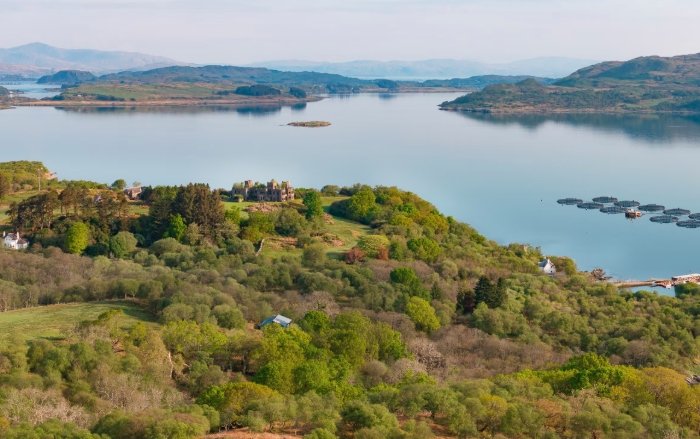A sprawling Scottish island featuring ancient ruins, pristine beaches, and 1,100 acres of dramatic terrain has just gone on sale for the first time in nearly a century. The price? £5.5 million — or around $7.5 million.
Shuna Island, located just off Scotland’s picturesque west coast near the Sound of Shuna, is drawing international attention not just for its beauty, but for the rarity of such an offering. It’s not every day a private island with a crumbling 18th-century castle and eight residential properties comes to market.
It’s Big, It’s Wild, and It’s Been Off-Limits for Generations
For 80 years, the island was privately owned and kept largely out of public reach. It now enters the market via a joint listing from Knight Frank and Sotheby’s International Realty.
“This certainly stands above the rest,” said Tom Stewart-Moore, partner at Knight Frank’s Edinburgh office. “It feels like something of scale.”
He’s not wrong. Most private islands in the UK are little more than rocky outcrops or modest chunks of land with no real infrastructure. Shuna? It’s got roads, moorings, cottages, and even its own hydroelectric system.
The castle — though mostly in ruins — adds gravitas to the property. Perched above the sea and blanketed in moss, it evokes the long-forgotten days of Scottish lairds and clan skirmishes.
And yes, there’s Wi-Fi.
One-sentence sidebar: This is Outlander meets Airbnb — with a medieval twist.

What You Actually Get for £5.5 Million
The estate agents are clear: this isn’t a fixer-upper fantasy. It’s a fully functioning private island with the potential for eco-tourism, private retreat development, or conservation projects.
Here’s a breakdown of what comes with the island:
-
1,100 acres of land, including hills, woodlands, and coast
-
Eight houses, including traditional stone cottages
-
A ruined 18th-century castle, partially intact
-
Three miles of private coastline
-
A jetty and slipway for boats
-
Hydroelectric plant supplying sustainable power
-
Fishing and stalking rights, including red deer and sea trout
Current owners have used the island as a small-scale tourism destination, offering nature getaways and self-catering cottages. But there’s serious development potential if a buyer wants to go big.
Location, Location, Seclusion
Shuna is part of the Slate Islands group and sits just south of the island of Lismore. It’s accessible via boat from the mainland — a short hop from Loch Melfort or the village of Arduaine.
The setting is almost painfully scenic. Think: lochs framed by rugged hills, seals basking on the rocks, and zero light pollution. The west coast of Scotland already pulls millions of tourists annually, and demand for secluded, immersive retreats has soared since the pandemic.
That’s made islands like Shuna more appealing — especially to ultra-wealthy buyers looking to unplug without compromising on modern comforts.
One-sentence pitch: It’s quiet, it’s remote, and nobody can build a block of flats next door.
So Who Buys a Scottish Island in 2025?
Private islands aren’t just the domain of Bond villains and reclusive aristocrats anymore. Over the last decade, a mix of tech entrepreneurs, financiers, and conservationists have entered the market.
According to Knight Frank’s 2024 Wealth Report:
| Buyer Type | Share of Island Purchases (UK) |
|---|---|
| Private individuals | 55% |
| Institutional trusts | 20% |
| Conservation groups | 15% |
| Other (tourism, NGOs) | 10% |
Stewart-Moore says he’s already fielding international inquiries — including interest from American and European buyers. “We expect this to generate attention from clients looking for heritage, space, and privacy,” he added.
There’s also speculation that high-net-worth investors may view Shuna as a hedge — not just against inflation, but against the growing volatility of urban life.
Romance Meets Regulation: The Scottish Land Question
Despite the romance of private island life, there’s also scrutiny. Land ownership in Scotland is increasingly political, especially when it comes to large estates.
The Scottish Government’s Land Reform Bill, currently under consultation, could require greater transparency and potentially place caps or obligations on land sales over 1,000 hectares. Shuna, at around 445 hectares, narrowly ducks the current threshold — but it’s close enough to raise eyebrows.
Community buyouts have also gained traction in recent years. Locals from places like Ulva and Eigg successfully took control of their islands through collective action, shifting ownership models from elite to democratic.
So while the listing is legal, and entirely within private rights, any new buyer will face a careful dance between preservation, development, and public perception.
One-sentence warning: Owning a Scottish island may come with more eyes watching than you’d expect.
A Piece of the Past, a Bet on the Future
In the end, Shuna Island is both a slice of untouched wilderness and a tangible link to Scotland’s layered history. Its name, derived from the Norse “Sùna,” hints at Viking origins. Its castle ruins echo feudal struggles long past. And its forests now whisper with modern potential.
Whoever buys it next will inherit more than cottages and coastlines. They’ll inherit a living landscape — one shaped by centuries, and now, perhaps, a turning point.


















